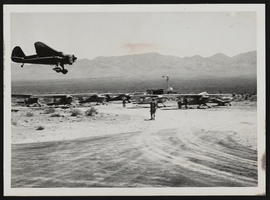Search the Special Collections and Archives Portal
Search Results

Transcript of interview with Laura Gunning by Mike Martinez, March 5, 1981
Date
Archival Collection
Description
On March 5, 1981, Mike Martinez interviewed Laura Gunning (born 1923 in Los Angeles, California) about her life in Las Vegas, Nevada. Gunning first talks about her family background, her church membership, education, and the minimum wage. She also talks about the Las Vegas Strip, the first businesses and markets in Las Vegas, change in climate, and family trips.
Text

Photograph of airplanes at Lazy 88 Ranch, Pahrump (Nev.), 1950s
Date
Archival Collection
Description
Image
Randy Char oral history interview
Identifier
Abstract
Oral history interview with Randy Char conducted by Cecelia Winchell and Stefani Evans on December 15, 2021 for Reflections: The Las Vegas Asian American and Pacific Islander Oral History Project.
Randy discusses his family history, his childhood growing up in California, and his undergraduate education. He shares his employment history that ranged from selling life insurance to trading stocks and finally selling luxury real estate. Randy talks about pursuing an MBA program at Pepperdine University during the 2008 financial crisis and how his capstone project idea of luxury real estate lounges helped him to open his own brokerage in Las Vegas in 2014 before becoming a real estate broker for Sotheby's. Randy also shares his thoughts on diversity within Asian cultures and different Asian American Pacific Islander (AAPI) organizations that helped him to "reclaim his Asian identity" including the Asian Real Estate Association of America (AREAA) and the Leaders Forum.
Archival Collection
Kerin Scianna Rodgers oral history interview
Identifier
Abstract
Oral history interview with Kerin Scianna Rodgers conducted by Dennis McBride on February 24, 1998 for the Las Vegas Gay Archives Oral History Project. Rodgers discusses arriving in Las Vegas, Nevada and her background in the arts. She discusses her position as Special Assistant to the Governor and being appointed as a commissioner for the performing arts. Rodgers also discusses opening her bar, Gipsy.
Archival Collection
Floyd Jenne oral history interview
Identifier
Abstract
Oral history interview with Floyd Jenne conducted by Gordon Brusso on April 04, 1976 for the Ralph Roske Oral History Project on Early Las Vegas. In this interview, Mr. Jenne discusses living and working in McGill, Nevada in the 1920’s and 1930’s. He offers insight into the school system in McGill, as well. He also speaks about working in Boulder City, Nevada as a police officer with the Bureau of Reclamation.
Archival Collection

Transcript of interview with Bruce Woodbury by Claytee White, February 25, 2009
Date
Archival Collection
Description
When Bruce Woodbury, native Las Vegan, attorney, and former county commissioner, looks back on growing up, he immediately says: My first memory of a house here in Las Vegas was in the John S. Park area. The Woodbuiy family lived in two houses in the neighborhood and attended only two schools, John S. Park Elementaiy and Las Vegas High School. Bruce's recollections begin in the 1940s, when they lived on the edge of town. Bruce has what he calls a "nostalgic yearning for the old Las Vegas, even though today it's an exciting, vibrant community in many ways." And during this oral history interview, he recalls the safe feeling of the times—unlocked doors and children allowed to roam more freely than today. The Strip was a "separate world" where kids like himself might go to a show occasionally with their parents, celebrate a prom dance or, as he did, get a part-time job. One of Bruce's jobs included being a busboy at the Flamingo Hotel & Casino where he confesses to learning and
Text

Transcript of interview with Francis E. Hughes by Mark E. French, February 23, 1977
Date
Archival Collection
Description
On February 23, 1977, collector Mark E. French interviewed local farmer, Francis E. Hughes (born March 9th, 1917 in Mesquite, Nevada) in his home in Mesquite, Nevada. This interview offers an overview of the general lifestyle and culture in Mesquite. Mr. Hughes mother, Orilla Leavitt, was born in Bunkerville, Nevada. Members of Mr. Hughes’s family were amongst the first settlers in the Mesquite area.
Text

Transcript of interview with Marion Brooks by Kathleen Kasmir, February 24, 1975
Date
Archival Collection
Description
On February 24, 1975, Kathleen Kasmir interviewed Marion Brooks (born 1913 in Santa Ana, California) about his life in Southern Nevada and his work as a mining engineer. Brooks first talks about his background before talking extensively about his early work in mining. Brooks also mentions some of the professional mining societies of which he was a part, and the two then move on to discuss gambling, recreational activities, and the atomic testing. Other topics covered during the interview include the price of groceries and food, the El Rancho Vegas, social changes, population growth, and environmental changes. The end of the interview then shifts back to Brooks’ work in mining at Blue Diamond and then a discussion on the possible locations of three lost mines.
Text

Transcript of interview with Carl Ciliax by Gary Wood, March 8, 1980
Date
Archival Collection
Description
On March 8, 1980, Gary Wood interviewed Carl Ciliax (born 1941 in Las Vegas, Nevada) about his experiences living in Nevada. Ciliax first describes his family history, his early interests in wildlife, and his background and education in artwork. Ciliax then discusses his early experiences in hunting and his eventual interest in conservationism and preservation, including his involvement with organizations that sought the protection of desert bighorn sheep and the protection of wildlife in general. The two talk more about wildlife, the early development of Las Vegas, and the effects of the atomic testing. The interview concludes with Ciliax’s recollection of recreational activities and some of his thoughts on conservationism.
Text

Transcript of interview with Dan Hill by John Bennett, March 1, 1979
Date
Archival Collection
Description
On March 1, 1979, John L. Bennett interviewed Dan Hill (born May 20, 1914 in Illinois) in his home at 2130 Walnut Road, Las Vegas, Nevada, about his memory of Southern Nevada. In addition to the collector and informant, there is an unidentified woman present during the interview. Hill explains that he originally came to Nevada in search of work. He briefly moved to Europe during the First World War where he served in the Army; at the end of the war, Hill returns to Las Vegas to work at the Nevada Test Site. Hill then goes in-depth about his experience as a worker at the Nevada Test Site and different mining sites that he had also worked at. The two briefly discuss the different sheriffs that had been in charge of Las Vegas, and how many people came to Las Vegas to work at the Henderson Magnesium Plant and Hoover Dam in addition to the Nevada Test Site.
Text
